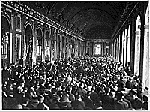![]()
On 28 June 1914 Gavrilo Prinzip (1894-1918), a rogue Bosnian-Serbian nationalist, assassinated the Archduke Franz Ferdinand (1863-1914), heir to the throne of the Austro-Hungarian Empire. This event way off in backwater Sarajevo touched off a sequence of actions that led to the outbreak of World War I. There followed four years of ghastly warfare that brought about the wholesale destruction of an entire generation of young men.
Although U.S. President Woodrow Wilson (1856-1924) initially affirmed a policy of American neutrality in the European conflict, the United States eventually did enter the war in 1917. Once that happened, Wilson saw the need for a new type of peace treaty to prevent any future war. In his war address to Congress in April 1917, Wilson spoke boldly of the need for the self-determination of peoples and nations, of a peace treaty without territorial acquisitions, and of a future that guaranteed the rights of man and that ensured a world safe for democracy.
Eventually, Wilson settled on the idea of a League of Nations as the tool to accomplish these goals, and he elaborated his proposal in the Fourteen Points which he presented to Congress on 8 January 1918. Of course, the devil is in the details, and implementing the idea of a League on Nations proved to be a bit problematic for Wilson after the war was over.
When Germany agreed to and signed an armistice in November 1918, it did so on the basis of Wilson's Fourteen Points. This, however, caused confusion because France and Great Britain, as America's wartime allies, had made no commitment to undertake any negotiations on the basis of Wilson's points. This was not immediately an issue in the armistice negotiations, because Germany was in no shape to continue the war. The disagreement over terms and the peace process, however, became manifest in the negotiations for a final peace treaty during the Paris Peace Conference when Germany was excluded from the negotiations.
The Paris Peace Conference began in early 1919 as a triumphal gathering of allied diplomats--again, representatives of the defeated powers were not invited--much like past major European diplomatic conferences such as the Congress of Vienna in 1815 or the Berlin Conference (aka Congo Conference) of 1885.
In the protracted diplomatic discussions at Versailles, Wilson, David Lloyd George, the British Prime Minister (1863-1945), Georges Clemenceau, the French Premier (1841-1929), and Vittorio Orlando, the Italian Prime Minister (1860-1952), all compromised their initial bargaining positions in a way that left each subject to bitter recrimination from their contemporaries and condemnation from future historians. For example, Wilson abandoned much of his original principles when he supported territorial acquisitions, but he did so quite inconsistently. For instance, he supported Italy's claims in the Trentino, but not Italian claims in Fiume. Lloyd George, similarly, agreed to divide up the German colonial empire but was more cautious with respect to German territorial changes in Europe. Clemenceau did oversee the return of Alsace-Lorraine to France and did get a demilitarized zone in the Rhine River valley, but he did not obtain the Rhine River as the Franco-German border.
Almost immediately after the signing of the Treaty of Versailles, the diplomatic situation changed dramatically. The U.S. Senate refused to ratify the treaty, and then Wilson fell ill and was unable to continue his work. The British began having second thoughts about the severity of the treaty and their commitment to Europe, and the French became overly preoccupied with their security in Europe and were unwilling to assume any other obligations.
Many later historians and contemporary analysts pointed directly to the "problems" caused by the treaty as the cause for the rise of Benito Mussolini (1883-1945) and the fascist movement in Italy and Adolf Hitler (1889-1945) and national socialism in Germany. Indeed, it has often been claimed that the Versailles Treaty merely started the chain of events that became a "road to war" (World War II). In reality, that was far from the case. The Versailles document (and all of the subsequent treaties), despite shortcomings, did provide a workable peace, if the diplomats had been willing to continue to work within the context of the treaty.
